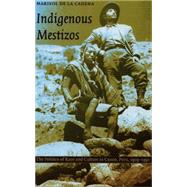Indigenous Mestizos
, by Cadena, Marisol De LA; Mignolo, Walter D.; Silverblatt, Irene; Sald & iacute; var-hull, Sonia- ISBN: 9780822324201 | 0822324202
- Cover: Paperback
- Copyright: 5/1/2000
In the early twentieth century, Peruvian intellectuals, unlike their European counterparts, rejected biological categories of race as a basis for discrimination. But this did not eliminate social hierarchies; instead, it redefined racial categories as cultural differences, such as differences in education or manners. InIndigenous MestizosMarisol de la Cadena traces the history of the notion of race from this turn-of-the-century definition to a hegemony of racism in Peru.De la Cadenars"s ethnographically and historically rich study examines how indigenous citizens of the city of Cuzco have been conceived by others as well as how they have viewed themselves and places these conceptions within the struggle for political identity and representation. Demonstrating that the termsIndianandmestizoare complex, ambivalent, and influenced by social, legal, and political changes, she provides close readings of everyday concepts such as marketplace identity, religious ritual, grassroots dance, and popular culture, as well as of such common terms asrespect,decency, andeducation. She shows howIndianhas come to mean an indigenous person without economic and educational means-one who is illiterate, impoverished, and rural.Mestizo, on the other hand, has come to refer to an urban, usually literate, and economically successful person claiming indigenous heritage and participating in indigenous cultural practices. De la Cadena argues that this version of de-Indianization-which, rather than assimilation, is a complex political negotiation for a dignified identity-does not cancel the economic and political equalities of racism in Peru, although it has made room for some people to reclaim a decolonized Andean cultural heritage.This highly original synthesis of diverse theoretical arguments brought to bear on a series of case studies will be of interest to scholars of cultural anthropology, postcolonialism, race and ethnicity, gender studies, and history, in addition to Latin Americanists.







